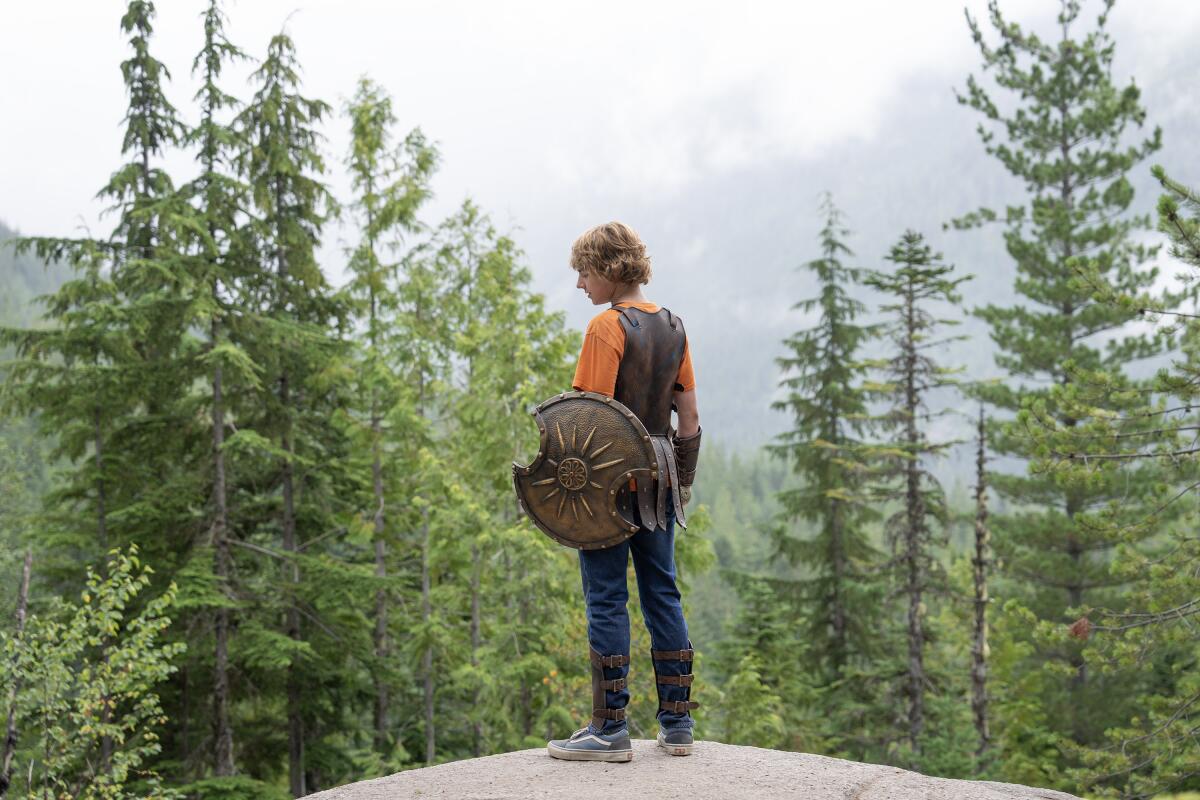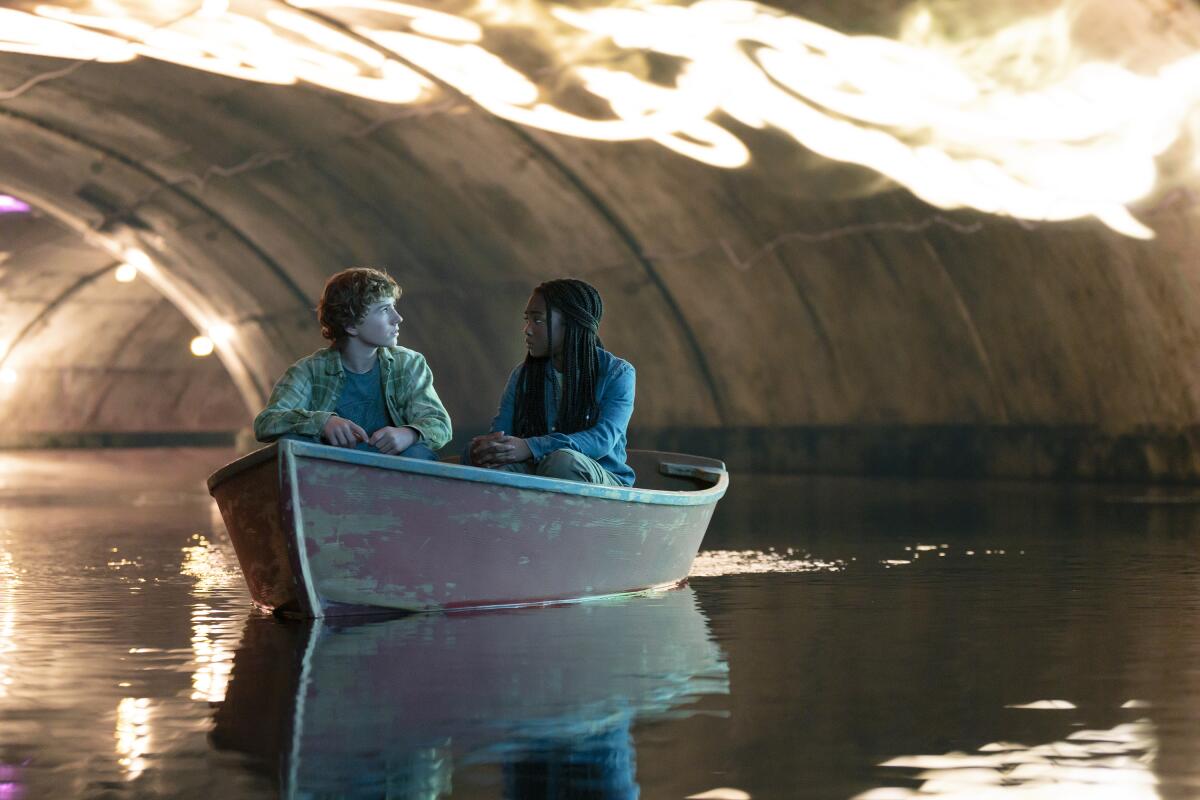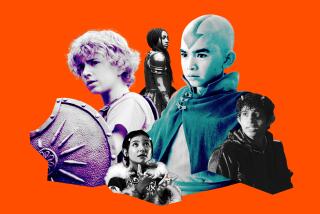Disney’s ambitious YA yarn ‘Percy Jackson and the Olympians’ never puts a foot wrong

“Percy Jackson and the Olympians,” Rick Riordan’s YA novel series, has become a television show, premiering Wednesday on Disney+, and it is as good as can be.
I might easily have looked askance at it, or not looked at all. In simple terms, the books begin as a “Harry Potter” knockoff: A special child, growing up in difficult circumstances, comes into latent supernatural powers, attracting the attention of good and bad forces. He is transported to a magical academy where a wise master will guide him, and joins with two peers to fight the bad things coming for him, and for the world. It’s not like J.K. Rowling invented any of that, either — there are bits and pieces of it all over children’s and genre literature and everything George Lucas thought up after “American Graffiti” — but she did gather it under one cover and identify a market for YA fantasy that has so far proved inexhaustible.
The twist in “Percy Jackson” is that we are not among wizards and warlocks but Greek mythological figures, who, for whatever reason, are running around the United States, in and out of the mystical veil that keeps them situationally invisible from the normals. That literary spin does elevate it a bit and reflects what kids might be getting a taste of elsewhere, assuming Greek mythology still counts as basic cultural literacy. That may be assuming a lot these days.
Even though he is cute enough to star in a television show, 12-year-old Percy (Walker Scobell), for Perseus, is bullied and mocked. He’s dyslexic and has ADHD and sometimes sees strange creatures no one else can see, rambling through New York City. His one friend, relatively recently acquired, is Grover (Aryan Simhadri), who is not what he seems. On an outing to the Metropolitan Museum, after Percy unconsciously unleashes a superpower on a nasty classmate, he is attacked by a teacher, Mrs. Dodds (Megan Mullally), who turns into a Fury; she is dispatched by a magical pen given to Percy by another teacher, Mr. Brunner (Glynn Turman), who is also not what he seems. The title of this episode is “I Accidentally Vaporize My Pre-Algebra Teacher.”
Things move quickly thereafter. Grover, it turns out, is a satyr, charged with protecting Percy; Mr. Brunner is really a centaur named Chiron. And Percy himself will learn, with destabilizing suddenness, that he’s a demigod, the son of a human mother, Sally (Virginia Kull, whose warm, deeply felt performance does much to establish the emotional ground of the series), and a Greek god she met on the beach at Montauk, like you do. (There is a loser stepfather in the picture, Timm Sharp as Gabe, who feels acquired merely as cover.) A race in the rain to deliver Percy to the safety of Camp Half-Blood — terrible name for a camp, even if accurate — with a minotaur, or the Minotaur, in hot pursuit, is terrifically exciting and exceptionally well staged and edited, as much suggested as shown.

At camp, which combines Catskills rusticity with Greek architectural elements, Percy will find that he’s not alone among the illegitimate, half-abandoned children of gods. But his particular parentage qualifies him as both especially special and especially endangered, a rare “forbidden child.” (I can’t decide whether the identity of his father counts as a spoiler, and of course a large part of the audience for the series already knows it, but I’ll play coy, since the show holds that information back from Percy through the first episode.) This doesn’t make him any less bullied than he was back in New York. Mean kids, they’re everywhere.
Here we meet Jason Mantzoukas as Dionysus, or Mr. D., the camp director (an odd choice, if you know your Dionysus), which spells comedy; Luke (Charles Bushnell), a son of Hermes, who seems friendly; and Annabeth (Leah Sava Jeffries), a tough little daughter of Athena, who will become, after some initial antagonism, the third member of our heroic trio alongside Percy and Grover.
The plot will be driven by the matter of Zeus’ stolen thunderbolt — the book adapted here is titled “The Lightning Thief” — which must be found before a ruckus in Olympus endangers the mortal world. That this will evolve into a road picture is clear from the handsome credits, which play off Deco mural art — there is a contextual reason for that, involving the Empire State Building — and give us trains and buses and taxis and St. Louis’ Gateway Arch. The American cast and setting distinguish it from “Potter” as much as the Greek references, and the series plays a little like a kids’ fantasy version of “North by Northwest,” with maybe a touch of Bryan Fuller’s adaptation of Neil Gaiman’s “American Gods.”
“Percy Jackson” is witty without diminishing the emotional gravity of the material — reliable and unreliable parents, true and false friends, life and death — and does a lovely job of mixing its extraordinary and ordinary worlds. Perhaps most important, it gives us kids who talk like kids (and excellent young actors to play them). They are unusually brave and inventive for 12-year-olds, to be sure, but in ways a 12-year-old viewer might imagine themselves being; not the only problem with Chris Columbus’ pedestrian 2010 film of “The Lightning Thief,” over which Riordan had no say, was the decision to age the protagonists into their late teens. (That’ll happen naturally, if the series keeps going.) Supported by Annabeth, who is a hothead, and Grover, who is careful, Percy has strong motivations to carry on through life-threatening challenges from mythological creatures that have had millenniums to hone their particular life-threatening skills. He’s got a nice ironic streak, but he’s also full of trepidation, confusion, insecurity, questions and sadness, and Scobell does a fine job of selling the feelings and the fight.
I haven’t read Riordan’s books, but he co-created the series with Jonathan E. Steinberg, who created the excellent Jeff Bridges espionage series “The Old Man,” which in itself says something about the series’ unconventional ambitions — as does the choice of pilot director James Bobin, who directed (and co-created) “Flight of the Conchords” and was the initial director of “The Mysterious Benedict Society,” another first-rate YA adaptation (which Disney+ unwisely canceled and has seemingly hidden from the world).
I would think fans of the books would be more than satisfied, but anyone ought to be; from script to casting to direction to production design to cinematography to special effects, the series never puts a foot wrong. Of course, as with any such invented world, one must accept some arbitrary rules without worrying too much about what strictly makes sense; neither should you stress over how the mythological references accord to what you remember from reading Edith Hamilton or Robert Graves. It won’t be on the test.
More to Read
The complete guide to home viewing
Get Screen Gab for everything about the TV shows and streaming movies everyone’s talking about.
You may occasionally receive promotional content from the Los Angeles Times.







